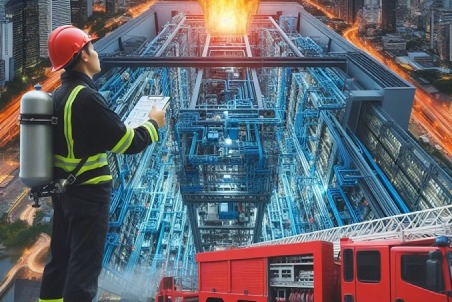Fire Protection System Design
Fire Protection System Design Course Syllabus
This course offers a thorough exploration of fire protection system design principles, regulations, and practical applications. Participants will delve into the latest standards and codes governing fire protection, learning how to effectively design, install, and maintain systems to safeguard against fire hazards. Gain invaluable insights into fire suppression, detection, and alarm systems to ensure compliance and enhance safety in diverse environments.
1. Introduction to Fire Protection
• Understanding the basics of fire science
• Overview of fire behavior and development
• Importance of fire protection in different building types
2. Building Classification and Codes
• Introduction to building classifications (residential, commercial, industrial)
• Familiarization with relevant fire codes and standards
• Case studies on fire incidents and lessons learned
• Module 3: Fire Prevention Measures
• Identifying potential fire hazards in different buildings
• Implementing fire prevention strategies
• Role of building design in fire prevention
3. Fire Detection and Alarm Systems
• Types of fire detection systems
• Choosing the right alarm system for different buildings
• Maintenance and testing procedures
4. Fire Suppression Systems
• Overview of fire suppression systems (sprinklers, extinguishers, gas systems)
• Design considerations for various building types
• Emergency response planning
5. Emergency Evacuation Procedures
• Developing and implementing evacuation plans
• Conducting fire drills for different building occupancies
• Special considerations for high-rise buildings and large complexes
6. Building Infrastructure and Fire Resistance
• Understanding the role of building materials in fire resistance
• Fire-rated construction methods
• Retrofitting existing buildings for enhanced fire protection
7. Specialized Buildings and Occupancies
• Focus on unique fire protection challenges in specific building types (hospitals, schools, warehouses)
• Tailoring fire protection measures for special occupancies
8. Legal and Regulatory Compliance
• Overview of local, national, and international fire codes
• Legal responsibilities of building owners and managers
• Case studies on legal implications of fire incidents
9. Emerging Technologies in Fire Protection
• Introduction to cutting-edge technologies (fire-resistant materials, smart fire detection)
• Integration of technology for enhanced fire protection
Capstone Project:
• Develop a comprehensive fire protection plan for a specific building type
• Present and defend the plan in a simulated scenario
Assessment:
• Quizzes and exams on each module
• Participation in class discussions and case studies
• Capstone project evaluation
This course is designed to provide a holistic
understanding of fire protection for diverse building
types, equipping participants with the knowledge and
skills necessary to assess, plan, and implement effective
fire protection measures.

New Batch Date & Timing
- Starting Date: First Week of The Month
- Class Timing: Contact Us
- Course Duration: 3-4 Months
Contact us !
- +1 945 265 2331
- contact@everestmepinstitute.com
Course Cost
Cost:
- Course Starting Fee: $5000
Eligibility:
- For engineering courses, minimum associate degree (2 -year) is required, Bachelor’s degree is preferred.
- For CAD/3D drafting courses, minimum high school degree is required.
- Proof of eligibility to work in the USA is required before starting the course.
Course Benefits & Other
Services:
- Learn hard skills that will serve lifetime.
- Due to shortage of electrical, mechanical and plumbing engineers, MEP engineer’s compensation is growing fast all over the United States.
- 100% placement assistance with resume preparation,mock interviews, and marketing.
- First year job support and guidance by in-house experts.
- H1B and GC sponsorship available for qualifed candidates. Must have work permits.
- We get paid only if you get paid, so our team is 100% dedicated to your success.
- We are a team of industry professionals ranging from 10-20 years of experience in MEP and civil engineering industry.
